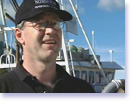| INTERVIEW
TRANSCRIPT - Terry Gardiner
We see a growing concern of our customers around the world, both in the United States and Europe, about whether our fisheries are sustainable, are fisheries being managed? We’ve seen a concern over, say, swordfish. There’s a lot of concern over environmental issues — pollution in rivers. And it’s just a growing thing happening all over the world.
Alaska at one time, more than a century ago was a virgin fishery and Alaska learned the hard way that they could over fish a resource. And that was really one of the primary things behind Alaska becoming a state. And since Alaska has become a state, there’s been quite a system of conservation management being instituted to be sure that we have a renewable resource and it’s managed on a sustained basis. And that’s really why today we have really healthy salmon runs in contrast to a lot of other places around the world.
I think when people go shopping nowadays, they look for a lot of things. Dolphin free tuna is an example of a thing that they look at. They read the nutrition label. They want to know what they’re buying, and I don’t think that every consumer is going to read every label. But I think a lot of people look at what they are buying and investing in and want more information and they are going to see this label and feel that somebody has looked at the scientific side and made sure that this is a sustainable fishery and they are buying a product that they feel okay about.
A sustainable fishery means a fishery that is renewable that can be fished year after year at the same fishery level and still be there ten, twenty, thirty years from now — like Alaska salmon.
Yeah. I think that the sustainable fisheries emblem is going to catch on and have a lot of impact. And it really is going to go back to what consumers care about. If consumers care about what they’re buying and why they’re buying it and they want to see fisheries sustained, then businesses are going to follow it and ultimately the government, the people who regulate the fisheries, are going to respond to the public sector and realize that they too have to do something about making fisheries sustainable. And not focus so much on the short run — how much fish can we catch this year — and then a year later find out there’s no fish and have to close down the fishery.
Without MSC, right now there is nothing out that that the consumer can look at on the label and feel any confidence that somebody that is, you know, science based and doesn’t have an axe to grind, that’s independent, and has actually looked and decided whether a fishery is sustainable. And MSC is that.
Sustainable fisheries really are a benefit most of all to the industry, not just to consumers, because what we have in many fisheries around the world is this boom bust cycle which is totally destructive to the fishermen to the processors to everyone in the economic chain who is dependent on it. So it’s really for our own good, as an industry, to have a sustainable fishery In our short term greed we get carried away and over fish because we are worried about today and forget about the future. And I think the sustainable fisheries helps us do what we ought to do — what’s good for ourselves.
I think one of the unique things about Alaska is the fact that our constitution here in the state of Alaska, which is a modern constitution mandated and put right into the natural resources section of the constitution that the fisheries has to be managed in a scientific, sustain-yield basis. And that has created a platform and kind of a driver for the state government to govern the state like that. And I think people in Alaska believe in it and follow it and believe in it because it is part of their state constitution.
Our plan at Norquest is to use the MSC certification as a competitive edge and we will be going to our customers in Asia, and the United States and Europe and telling them hey, we’ve got this certification. And using it as a sales point about Alaska salmon and encouraging them to use that in their packaging and with their label so they can differentiate themselves. Our customers are looking for a way to differentiate themselves. And a way to promote Alaska salmon which they are investing in their labeling and their marketing programs so I think they are going to be looking at this There’s been a lot of attention on health issues and environmental issues and all of this, this whole area. A lot of concern about food and where it’s coming from and our customers are really tuned into that.
|
 Terry
Gardiner is the CEO of Norquest Seafoods in Juneau, Alaska.
Terry
Gardiner is the CEO of Norquest Seafoods in Juneau, Alaska.